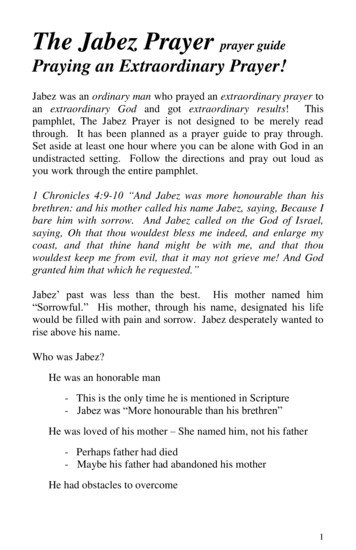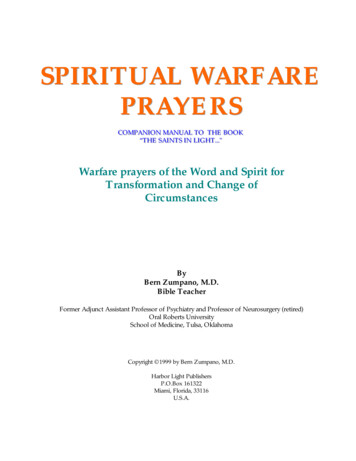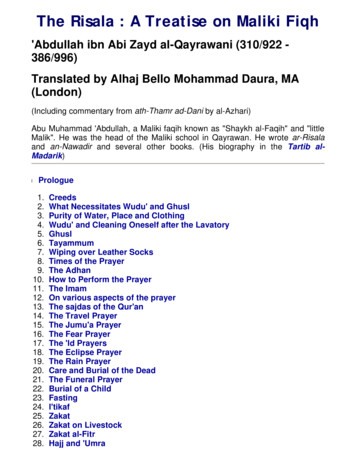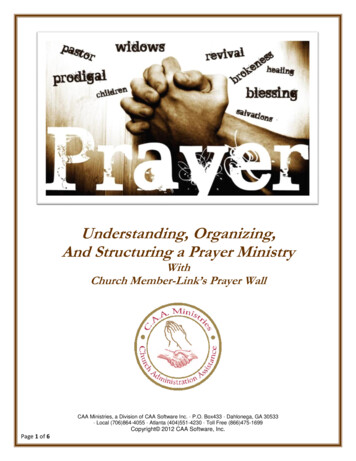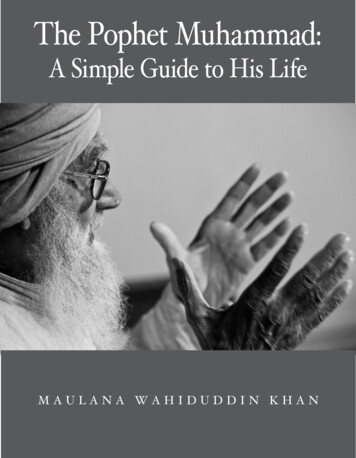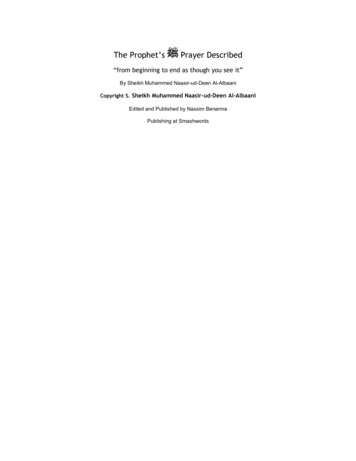
Transcription
The Prophet’sPrayer Described“from beginning to end as though you see it”By Sheikh Muhammed Naasir-ud-Deen Al-AlbaaniCopyright S. Sheikh Muhammed Naasir-ud-Deen Al-AlbaaniEdited and Published by Nassim BenamraPublishing at Smashwords
Table of Contents1- Introduction1. Reasons Behind The Compilation Of This Book2. Methodology Of This Book3. Sayings Of The Imaams Regarding Following The Sunnah And Ignoring Their ViewsContradictory To It1)-Abu Haneefah (Rahimahullaah)2)-Maalik Ibn Anas (Rahimahullaah)3)-Shaafi’i (Rahimahullaah)4)-Ahmad Ibn Hanbal (Rahimahullaah)5.-The Imaams’ Followers Leaving Their Views If These ContradictedThe Sunnah2- Misconceptions Cleared1)-Misconception One2)-Misconception Two3)-Misconception Three4)-Misconception Four3- The Prophet’s Prayer Described1. Facing The Ka’bah2. Standing In Prayer1)-The Prayer Of A Sick Person In A Sitting Position2)-Prayer On A Ship3)-Sitting And Standing In The Night Prayer (Tahajjud)4)-Prayer Wearing Shoes And The Command To Do So5)-Prayer On The Pulpit (Minbar)6)-The Sutrah, And The Obligation To Have One7)-What Breaks The Prayer8)-Prohibition Of Prayer Facing The Grave3. Intention4. Takbeer1)-Raising The Hands2)-To Place The Right Arm On The Left Arm, And The Command For It3)-To Place The Hands On The Chest5. To Look At The Place Of Prostration, And Humility6. Opening Supplications (Du’aa’s)7. Recitation
1)-Recitation Of One Verse At A Time2)-The Necessity Of Al-Faatihah, And Its Excellence3)-The Abrogation Of Recitation Behind The Imaam In The Loud Prayers4)-The Obligation To Recite In The Quiet Prayers5)-The Aameen, And The Imaam’s Saying It Loudly6)-The Recitation After Al-Faatihah7)-Combining Similar Soorahs And Others In One Rak’ah8)-The Permissibility Of Reciting Al-Faatihah Only9)-Quiet And Loud Recitation In The Five Prayers And Others10)-Quiet And Loud Recitation In The Night Prayer (Tahajjud)11)-What He (Sallallaahu ’alaihi Wa Sallam) Used To Recite In The DifferentPrayers1-Fajr Prayer2-Zuhr Prayer3-’Asr Prayer4-Maghrib Prayer5- ’ishaa’ Prayer6-Night Prayer (Tahajjud)7-Witr Prayer8-Friday Prayer9-’eid Prayer10-Funeral Prayer12)-Tarteel13)-Correcting The Imaam14)-Seeking Refuge & Spitting Lightly During Prayer In Order To RepelTemptation8. The Rukoo’ (Bowing)1)-The Rukoo’ Described2)-The Obligation Of Being At Ease In Rukoo’3)-The Adhkaar Of Rukoo’4)-Lengthening The Rukoo’5)-Forbiddance Of Reciting The Qur’aan In Rukoo’6)-Straightening Up From The Rukoo’, & What Is To Be Said Then7)-Lengthening This Standing, & The Obligation To Beat Ease In It9. The Sujood (Prostration)1)-Going Down Into The Sajdah On The Hands2)-The Sajdah Described3)-The Obligation To Be At Ease In Sujood4)-The Adhkaarof Sujood5)-Forbiddance Of Reciting The Qur’aan In Sujood6)-Lengthening The Sajdah7)-The Excellence Of The Sajdah8)-Sajdah On The Ground, And On Mats9)-Rising From Sajdah10)-To Sit Muftarishan Between The Two Sajdahs
11)-Iq’aa’ Between The Two Sajdahs12)-The Obligation Of Being At Ease Between The Two Sajdahs13)-Lengthening The Sitting Between The Two Sajdahs14)-The Adhkaar Between The Two Sajdahs15)-The Second Sajdah16)-The Sitting Of Rest17)-Supporting Oneself With The Hands On Rising For The Next Rak’ah10. The Second Rak’ah1.)-The Obligation Of Reciting Soorah Al-Faatihah In Every Rak’ah11. The First Tashahhud1)-Moving The Finger In Tashahhud2)-The Obligation Of The First Tashahhud, & The Validity Of Supplication During It3)-The Manner Of Tashahhud4)-As-Salaah ’alaa An-Nabiyy(Sending Prayers On The Prophet) - Its Place & Manner5)-Important Notes About As-Salaah ’alaa An-Nabiyy - Sending Prayers On The Prophet OfThe Ummah6)-Du’aa’ In The First Tashahhud7)-Standing Up For The Third, And Then The Fourth, Rak’ah8.)-Qunoot In The Five Prayers Because Of A Calamity9)-Qunoot In Witr Prayer12. The Final Tashahhud1)-The Obligation Of This Tashahhud2)-The Obligation Of Sending Prayers On The Prophet (Sallallaahu ’alaihi WaSallam) InThis Tashahhud3)-The Obligation To Seek Refuge From Four Things Before Supplicating4)-Supplication Before The Salaam, & Its Various Types13. The Tasleem (Salutation Of Peace)1)-The Obligation Of The Tasleem14. Addendum15. Appendix 116. Appendix 217. Appendix 318. Appendix 419. Appendix 520. Appendix 6
21. Appendix 722. Appendix 823. Glossary24. Author’s Bibliography25. FootNotes
IntroductionPraise be to Allaah, who made Prayer compulsory on his slaves and ordered them to establishit and perform it well; who linked success and felicity to humility in Prayer; who made it thecriterion to distinguish between Eeman and Kufr; and who made it a restrainer from shamefuland unjust deeds.Prayers and peace be upon our Prophet Muhammad, who was addressed inthe Words of the Exalted: "And We have sent down to you the Message, that you mayexplain clearly to the people what is sent for them" (1), and who fully carried out thistask. The Prayer was one of the most important things which he explained to the people,verbally and practically, even praying on the pulpit once standing, bowing and prostrating,and then saying to them, I have done this so that you may follow me and learn my prayer(2) .He obligated us to copy him in his prayer, saying:”Pray as you have seen me praying” (3) He also gave the good tidings to whoever prayedlike him that such a person has a covenant with Allaah that He will enter him into the Garden,saying:“There are five prayers which Allaah, Mighty and Sublime, has made compulsory: he whoperforms ablution well for them, prays them at their proper times, and is complete intheir bowings, prostrations and humility, he has a guarantee from Allaah that He willforgive him; but he who does not do so, has no guarantee from Allaah: if He wishes, Hewill forgive him or if He wishes, He will punish him.” (4)Prayers and peace be also on his family and his pious and just Companions, who passed on tous his worship, prayer, sayings and actions (sallallaahu 'alaihi wa sallam), and who madethese, and these alone, a Madhhab and a path for them to follow; and also on those whofollow in their footsteps and tread their path until the Day of Judgment.When I finished reading the book of prayer in At-Targheeb wat-Tarheeb by al-Haafiz alMundhiri (rahimahullaah) and teaching it to our brothers, four years ago, it became clear tous all the important position of the Prayer in Islaam; and the reward, grace and respectawaiting those who establish and perform it well; and that all this varies, depending on itscloseness to the Prophet's prayer (sallallaahu 'alaihi wa sallam). This is what he indicated inhis saying,“Verily the slave prays a prayer of which nothing is written down for him except atenth, ninth, eighth, seventh, sixth, fifth, quarter, third or half of it. (5)Therefore, I reminded the brothers that it is not possible for us to perform prayer as it shouldbe performed, or even approach that, unless we know the detailed description of theProphet's prayer (sallallaahu 'alaihi wa sallam), including its essentials, manners, forms,supplications (du'aas) and remembrances (adhkaar), and then we make an effort to put thatknowledge into practice carefully, for then we could hope that our prayers would restrain usfrom shameful and unjust deeds, and that the reward and blessings mentioned in thenarrations would be written down for us.
However, detailed familiarity with all these aspects of prayer is unlikely to be achieved bymost people nowadays, even many scholars, because of their limiting themselves to aparticular Madhhab. But, as anyone concerned with assisting in compiling and studying thepurified Sunnah knows, in every Madhhab there are sunnahs which are not found in otherMadhhabs; moreover, in every Madhhab there are sayings and actions which cannot beauthentically traced back to the Prophet (sallallaahu 'alaihi wa sallam) -most of these arefound in the sayings of the later scholars (6), many of whom we see firmly attributing these tothe Prophet (sallallaahu 'alaihi wa sallam)! (7) This is why the scholars of Hadeeth may Allaahreward them well -have produced books of Takhreej on the famous books of the laterscholars, explaining the rank of each hadeeth given in them: whether e.g. authentic, weak orfabricated. Examples of these books of Takhreej are: Al-'Inaayah fi Ma'rifah Ahaadeeth alHidaayah and At-Turuq wal-Wasaa'il fi Takhreej Ahaadeeth Khulaasah ad-Dalaa'il by Shaikh'Abdul Qaadir ibn Muhammad al-Qurashi al-Hanafi; Nasb ar-Raayah li Ahaadeeth al-Hidaayahby Haafiz Zayla'i, and its abridged version ad-Dirayah by Haafiz Ibn Hajr al-Asqalaani, whoalso wrote Talkhees al-Habeer fi Takhreej Ahaadeeth ar-Raafi'i al-Kabir; there are manyothers, naming which will only lengthen this discussion.(8)[Back to contents]1-Reasons behind the Compilation of this Book, and some of its FeaturesSince I had not come across a comprehensive book covering this topic, I felt obliged toproduce a book which collected together as many features of the Prophet's prayer (sallallaahu'alaihi wa sallam) from the takbeer to the tasleem as possible, for the benefit of my Muslimbrothers who wished to follow the guidance of their Prophet (sallallaahu 'alaihi wa sallam) intheir worship, such that it would be easy for any who truly loved the Prophet (sallallaahu'alaihi wa sallam) to use this book to fulfil his command,"Pray as you have seen me praying."Thus I embarked on a difficult task, and researched the relevant ahaadeeth from the varioussources of Hadeeth, the book in your hands being the end result of it all. I stipulated onmyself that I would only give ahaadeeth which had an authentic sanad according to theprinciples and regulations of the science of Hadeeth. I disregarded any hadeeth whichdepended on unknown or weak narrators, whether it dealt with the outward form, adhkaar,excellence, etc. of the Prayer. This is because I hold that the authentic ahadeeth (9) aresufficient, leaving no need for anything weak, for the latter does not amount to anythingexcept zann (conjecture, suspicion), and incorrect conjecture at that; as the Exalted says:". And conjecture is of no use against the truth" (10)And the Prophet (sallallaahu 'alaihi wa sallam) said:“Beware of suspicion, for truly, suspicion is the most false of speech” (11)Therefore, we cannot worship Allaah by acting according to inauthentic ahaadeeth; in fact,the Messenger of Allaah (sallallaahu 'alaihi wa sallam) forbade us from this saying, Keep away
from saying things about me, except what you know (12); since he has forbidden us fromrelating weak narrations, it goes without saying that it is forbidden to act according to them.I have compiled the book as two texts: the main text and the subsidiary text. The main textincludes the text of ahaadeeth or phrases taken from them, as well as appropriate words tostring them together to give the book a fluency from start to finish. I have been careful topreserve the text of each hadeeth as it is found in the books of Sunnah; where a hadeeth hasdifferent wordings, I have chosen the version which best fits the fluency etc., but I havebrought together other wordings thus: "(in one version: . )" or "(in one narration: .)". Onlyrarely have I given the Companion who narrated the hadeeth, or explained in the main textwhich of the Imaams of Hadeeth have collected each hadeeth, in order to provide easierreading and reference. As for the subsidiary text, it is a commentary on the main text. In it Ihave traced the ahaadeeth to their sources, exploring their various versions and routes ofnarration. Along with this, I have commented on their isnaads and supporting narrations, withauthenticating and disparaging remarks on narrators, whether authentic or weak, judgedaccording to the rules of the science of Hadeeth. Often, one route of narration has additionalwords which are not found in other routes, so I have inserted these into the original hadeethin the main text whenever it is possible to do so without destroying the fluency, enclosing theaddition in square brackets: [.], usually without stating which of the sources were alone incontaining that addition. This has been done only if the hadeeth is originally on the authorityof the same Companion, otherwise I have given it separately, e.g. in the openingsupplications etc. This insertion of additional wordings is a tremendous advantage which youwill not find in many books -Praise be to Allaah, by Whose Favour good actions arecompleted.Next, I have mentioned in the subsidiary text the madhhabs of the scholars regarding thehadeeth traced, as well as the evidence and counter-evidence for each view, along with thestrengths and weaknesses of each argument. We have then selected out of that the correctview which we have given in the main text. Also in the subsidiary text, we have given someissues for which there is no text in the Sunnah, but which require ijtihaad, and do not comeunder the title of this book.Since the publication of this book with both main and subsidiary texts is not feasible right nowdue to various reasons, we have decided to publish only the main text of the book (along withbrief footnotes) by Allaah's Will, and named it "Sifah Salaah an-Nabi (sallallaahu 'alaihi wasallam), min at-takbeer ilaa at-tasleem ka'annaka taraahaa (The Prophet's Prayer Described,from beginning to end, as though you were watching it)".I ask Allaah to make this work sincerely for His Face, and to help my brothers in faith tobenefit from it, for He is the Hearer, the Answerer.[Back to contents]2-Methodology of this Book
Since the purpose of this book is to convey the guidance of the Prophet (sallallaahu 'alaihi wasallam) regarding Prayer, it was elementary that I would not limit myself to a particularMadhhab, for the reasons mentioned previously. Therefore, I would give whatever isauthentically proved from him (sallallaahu 'alaihi wa sallam), as has always been the way ofthe scholars of Hadeeth (13), whether of old or of the recent past (14), as the excellentsaying goes:The People of Hadeeth are the People of the Messenger, although they accompany him not,they are with his every movement (15).Thus this book would, Allaah Willing, gather whatever is relevant to each topic from thevarious contents of the books of Hadeeth and the books on the differences between theMadhhabs, such that the correct verdicts found in this book would not be found totally in anyone Madhhab. Hence the one acting on it, Allaah Willing, would be among those whom Allaahhad guided "by His Grace to theTruth concerning that in which they differed, for Allaahguides whom He will to a path that is straight." (16)When I adopted these principles for myself, i.e. to adhere to the authentic Sunnah, and toimplement them in this book as well as others, I knew for sure that this would not satisfyevery group of people or sect; in fact, it would result in some, if not most of them, insultingor criticising me. This does not matter to me, for I also know that to please everyone is anunattainable notion, and that "He who pleases the people by angering Allaah, Allaah willentrust him to the people", as the Messenger of Allaah (sallallaahu 'alaihi wa sallam) said (17);The reward is with Allaah for the author of the following lines:Nor could I ever escape from abuse, Even were I in a cave in a rugged mountain; For who canescape from the people unharmed, Even if he hides behind the eagle's wings?It is enough for me that I believe that this is the most upright way, which Allaah hascommanded the believers to take; which our Prophet Muhammad (sallallaahu 'alaihi wasallam), Chief of the Messengers, has explained. This is the path which was trodden by thePious Predecessors: the Companions, their Successors and those after them, including the fourImaams to whose Madhhabs the majority of Muslims today attribute themselves. All of themwere agreed on the obligation to stick to the Sunnah and to refer to it; to ignore every viewcontradictory to it, no matter how great the holder or propounder of that view, for the statusof the Messenger of Allaah (sallallaahu 'alaihi wa sallam) is far greater, and his example is fartruer. Because of this, I have acted on their guidance, followed in their footsteps and carriedout their commands to stick to the authentic hadeeth, even if this opposes their view. Thesecommands of theirs have influenced me greatly in my perusal of this path, and my rejectionof blind taqleed (following of opinion). I ask Allaah Exalted to reward them greatly.[Back to contents]3-Sayings Of The Imaams Regarding Following The Sunnah And Ignoring Their ViewsContradictory To It
It would be beneficial if we gave some of these here, for perhaps this will admonish or remindthose who follow the opinion of the Imaams -nay, of those far below the Imaams in rank-blindly (18), sticking to their madhhabs or views as if these had descended from the heavens!But Allaah, Mighty and Sublime, says:"Follow (O men!) The revelation given to you from your Lord, and follow not, as friendsand protectors, other than Him. Little is it you remember of admonition." (19)[Back to contents]1) Abu Haneefah (rahimahullaah)The first of them is Abu Haneefah Nu'maan ibn Thaabit, whose companions have narratedfrom him various sayings and diverse warnings, all of them leading to one thing: theobligation to accept the Hadeeth, and to give up following the opinions of the imaams whichcontradict it:1. "When a hadeeth is found to be saheeh, then that is my madhhab." (20)2. "It is not permitted (21) for anyone to accept our views if they do not know from where wegot them." (22)In one narration, "It is prohibited (23) for someone who does not know my evidence to giveverdicts (24) on the basis of my words."Another narration adds, ". for we are mortals: we say one thing one day, and take it backthe next day."In another narration, "Woe to you, O Ya'qub! (25) Do not write down everything you hear fromme, for it happens that I hold one opinion today and reject it tomorrow, or hold one opiniontomorrow and reject it the day after tomorrow." (26)3. "When I say something contradicting the Book of Allaah the Exalted or what is narratedfrom the Messenger (sallallaahu 'alaihi wa sallam), then ignore my saying." (27)[Back to contents]2) Maalik ibn Anas (rahimahullaah)As for Imaam Maalik ibn Anas, he said:1. "Truly I am only a mortal: I make mistakes (sometimes) and I am correct (sometimes).Therefore, look into my opinions: all that agrees with the Book and the Sunnah, accept it; andall that does not agree with the Book and the Sunnah, ignore it." (28)2. "Everyone after the Prophet (sallallaahu 'alaihi wa sallam) will have his sayings acceptedand rejected -not so the Prophet (sallallaahu 'alaihi wa sallam)." (29)3. Ibn Wahb said: "I heard Maalik being asked about cleaning between the toes duringablution. He said, 'The people do not have to do that.' I did not approach him until the crowd
had lessened, when I said to him, 'We know of a sunnah about that.' He said, 'What is that?' Isaid, 'Laith ibn Sa'd, Ibn Lahee'ah and 'Amr ibn al-Haarith narrated to us from Yazeed ibn 'Amral-Ma'aafiri from Abu 'Abdur-Rahman al-Hubuli from Mustawrid ibn Shaddaad al-Qurashi whosaid, 'I saw the Messenger of Allaah (sallallaahu 'alaihi wa sallam) rubbing between his toeswith his little finger.' He said, 'This hadeeth is sound; I had not heard of it at all until now.'Afterwards, I heard him being asked about the same thing, on which he ordered cleaningbetween the toes." (30)[Back to contents]3) Shaafi'i (rahimahullaah)As for Imaam Shaafi'i, the quotations from him are most numerous and beautiful (31), and hisfollowers were the best in sticking to them:1. "The sunnahs of the Messenger of Allaah (sallallaahu 'alaihi wa sallam) reach, as well asescape from, every one of us. So whenever I voice my opinion, or formulate a principle,where something contrary to my view exists on the authority of the Messenger of Allaah(sallallaahu 'alaihi wa sallam), then the correct view is what the Messenger of Allaah(sallallaahu 'alaihi wa sallam) has said, and it is my view." (32)2. "The Muslims are unanimously agreed that if a sunnah of the Messenger of Allaah(sallallaahu 'alaihi wa sallam) is made clear to someone, it is not permitted (33) for him toleave it for the saying of anyone else." (34)3. "If you find in my writings something different to the Sunnah of the Messenger of Allaah(sallallaahu 'alaihi wa sallam), then speak on the basis of the Sunnah of the Messenger ofAllaah (sallallaahu 'alaihi wa sallam), and leave what I have said."In one narration: ". then follow it (the Sunnah), and do not look sideways at anyone else'ssaying." (35)4. "When a hadeeth is found to be saheeh, then that is my madhhab." (36)5. "You (37) are more knowledgeable about Hadeeth than I, so when a hadeeth is saheeh,inform me of it, whether it is from Kufah, Basrah or Syria, so that I may take the view of thehadeeth, as long as it is saheeh." (38)6. "In every issue where the people of narration find a report from the Messenger of Allaah(sallallaahu 'alaihi wa sallam) to be saheeh which is contrary to what I have said, then I takemy saying back, whether during my life or after my death." (39)7. "If you see me saying something, and contrary to it is authentically-reported from theProphet (sallallaahu 'alaihi wa sallam), then know that my intelligence has departed." (40)
8. "For everything I say, if there is something authentic from the Prophet (sallallaahu 'alaihiwa sallam) contrary to my saying, then the hadeeth of the Prophet (sallallaahu 'alaihi wasallam) comes first, so do not follow my opinion." (41)9. "Every statement on the authority of the Prophet (sallallaahu 'alaihi wa sallam) is also myview, even if you do not hear it from me." (42)[Back to contents]4) Ahmad ibn Hanbal (rahimahullaah)Imaam Ahmad was the foremost among the Imaams in collecting the Sunnah and sticking to it,so much so that he even "disliked that a book consisting of deductions and opinions bewritten." (43) Because of this he said:1. "Do not follow my opinion; neither follow the opinion of Maalik, nor Shaafi'i, nor Awzaa'i,nor Thawri, but take from where they took." (44)In one narration: "Do not copy your Deen from anyone of these, but whatever comes from theProphet (sallallaahu 'alaihi wa sallam) and his Companions, take it; next are their Successors,where a man has a choice."Once he said: "Following (45) means that a man follows what comes from the Prophet(sallallaahu 'alaihi wa sallam) and his Companions; after the Successors, he has a choice." (46)2. "The opinion of Awzaa'i, the opinion of Maalik, the opinion of Abu Haneefah: all of it isopinion, and it is all equal in my eyes. However, the proof is in the narrations (from theProphet (sallallaahu 'alaihi wa sallam) and his Companions)."(47)3. "Whoever rejects a statement of the Messenger of Allaah (sallallaahu 'alaihi wa sallam) ison the brink of destruction." (48)These are the clear, lucid sayings of the Imaams (Allaah Exalted be pleased with them) aboutsticking to the Hadeeth and forbidding the following of their opinion without clearly-visibleevidence, such that mere opinion and interpretation is not acceptable.Hence, whoever adhered to whatever of the Sunnah that was proved authentic, even if itopposed some of the Imaams' sayings, he would not be conflicting with their madhhab, norstraying from their path; rather, such a person would be following all of them and would begrasping the most trustworthy hand-hold, which never breaks. However, this would not be thecase with the one who abandoned any of the authentic Sunnah simply because it contradictedtheir views; nay, such a person would be being disobedient to them and opposing their abovementioned sayings, while Allaah says:"But no, by Your Lord, they can have no (real) faith, until they make you judge inalldisputes between them, and find in their souls no resistance against your decisions,but accept them with the fullest conviction." (49)
He also says:"Then let those beware who withstand the Messenger's order, lest some trial befall themor a grievous penalty be inflicted on them." (50)Haafiz Ibn Rajab al-Hanbali (rahimahullaah) says:"Therefore it is obligatory on anyone who hears of a command of the Messenger of Allaah(sallallaahu 'alaihi wa sallam) or knows it, to explain it to the Ummah, advise them sincerely,and order them to follow his command, even if it contradicts the opinion of someone great.This is because the authority of the Messenger of Allaah (sallallaahu 'alaihi wa sallam) has themost right to be respected and followed, over and above the opinion of anyone great who hasunknowingly contradicted the Messenger's command in any matter. This is why theCompanions and those after would refute anyone who contradicted the authentic Sunnah,sometimes being very stern in their refutation (51), not out of hatred for that person, for theyloved and respected him, but because the Messenger of Allaah was more beloved to them,and his command was superior to the command of any other created being.Hence, when the order of the Messenger and that of someone else conflicted, the order ofthe Messenger would be more fitting to be enforced and followed. None of this would stopthem respecting the person they had opposed because they knew that he would be forgiven(52); in fact, the latter would not mind his instruction being opposed when the command ofthe Messenger of Allaah (sallallaahu 'alaihi wa sallam) was clearly shown to be opposite." (53)Indeed, how could they mind that, when they had ordered their followers to do so, as wehave seen, and had enjoined on them to abandon any of their views which contradicted theSunnah. In fact, Imaam Shaafi'i (rahimahullaah) told his companions to attribute the authenticSunnah to him also, even if he had not adopted it or had adopted something contradictory toit. Hence, when the analyst Ibn Daqeeq al-'Eid (rahimahullaah) collected together, in a bulkyvolume, the issues in which one or more of the four Imaams' madhhabs had contradicted theauthentic hadeeth, he wrote at the beginning of it, "It is prohibited to attribute these answersto the Mujtahid Imaams, and obligatory on the jurists who follow their opinions to know ofthese so that they do not quote them regarding these and thus lie against them." (54)[Back to contents]5) The Imaams' Followers Leaving their Views if these Contradicted the SunnahDue to all that we have mentioned, the disciples of the Imaams, a number of people fromthose of old, and a few from those of later time (55), would not accept all of their Imaam'sviews; they actually ignored many when they found them to be clearly against the Sunnah.Even the two Imaams, Muhammad ibn al-Hasan and Abu Yoosuf (rahimahullaah) differed fromtheir shaikh Abu Haneefah "in about a third of the Madhhab" (56) , as the books of masaa'ilprove. Similarly is said about Imaam al-Muzani (57) and other followers of Shaafi'i and otherImaams; were we to start giving examples, the discussion would become exceedingly, long,and we would digress from what we set out to do in this Introduction, so we shall limitourselves to two instances:
1) Imaam Muhammad says in his Muwatta'(58)(p. 158), "As for Abu Haneefah, he did notregard there being a prayer to ask for rain, but we hold that the imaam prays two rak'ahs andthen supplicates and holds out his wrapping garment ."2) We have 'Isaam ibn Yoosuf al-Balkhi, one of the companions of Imaam Muhammad (59) anda servant of Imaam Abu Yoosuf (60), who "would give verdicts contrary to Imaam AbuHaneefah because he did not know the latter's evidence, and other evidence would presentitself to him, so he would give verdicts using that." (61) Hence, "he would raise his hands onbowing (in prayer) and on rising from it" (62), as is the mutawaatir sunnah of the Prophet(sallallaahu 'alaihi wa sallam); the fact that his three Imaams (i.e. Abu Haneefah, Abu Yoosufand Muhammad) said otherwise did not prevent him from practising this sunnah. This is theapproach which every Muslim is obliged to have, as we have already seen from the testimonyof the Four Imaams, and others.To sum up: I sincerely hope that no follower of an Imaam will race to condemn the principlesof this book and abandon benefiting from the sunnahs of the Prophet (sallallaahu 'alaihi wasallam) which it contains, with the argument that they are contrary to his Madhhab. I hopethat such a person will instead consider what we have given of the exhortations of theImaams towards the obligation to act on the Sunnah and ignore their sayings contradictory toit. I hope also that he will realise that to condemn the attitude of this book is to condemnwhichever Imaam he is following, for we have taken these principles from those Imaams, aswe have explained. Therefore, whoever refuses to be guided by them on this path is in greatdanger, for such refusal necessitates turning away from the Sunnah, the Sunnah to which wehave been ordered to refer in cases of difference of opinion and on which we have beencommanded to depend.I ask Allaah to make us among those about whom He says,"The answer of the believers, when summoned to Allaah and His Messenger, in orderthathe may judge betweeen them, is no other than this: they say, "We hear and weobey" - itis such as these that will attain Success. It is those who obey Allaah andHisMessenger, and fear Allaah, and keep their duty to Him, who will triumph." (63)[Back to contents]Misconceptions ClearedThe preceding Introduction was written ten years ago, during which time it has becomeapparent to us that our words have had a positive effect on Muslim youth in guiding themtowards the obligation in matters of their Deen and worship to return to the pure sources ofIslaam: the Book and the Sunnah. Among them, there was an increase in the ranks of of thosewho practised the Sunnah and devoted themselves to it, -Praise be to Allaah -such that theybecame conspicuous for it. However, I still
3- The Prophet’s Prayer Described 1. Facing The Ka’bah 2. Standing In Prayer 1)-The Prayer Of A Sick Person In A Sitting Position 2)-Prayer On A Ship 3)-Sitting And Standing In The Night Prayer (Tahajjud) 4)-Prayer Wearing Shoes And The Command To Do So 5)-Prayer On The Pulp
